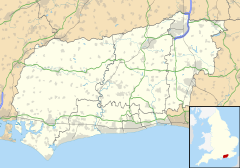West Chiltington
| West Chiltington | |
|---|---|
 Meetens mill |
|
| West Chiltington shown within West Sussex | |
| Area | 17.33 km2 (6.69 sq mi) |
| Population | 3,315 2001 Census 3,377 (2011 Census) |
| • Density | 191/km2 (490/sq mi) |
| OS grid reference | TQ090184 |
| • London | 40 miles (64 km) NNE |
| Civil parish |
|
| Shire county | |
| Region | |
| Country | England |
| Sovereign state | United Kingdom |
| Post town | PULBOROUGH |
| Postcode district | RH20 |
| Dialling code | 01798 |
| Police | Sussex |
| Fire | West Sussex |
| Ambulance | South East Coast |
| EU Parliament | South East England |
| UK Parliament | |
| Website | http://www.wchilt-parishcouncil.org.uk/ |
West Chiltington is a village and civil parish in the Horsham District of West Sussex, England. It lies on the Storrington to Broadford Bridge road, 2.6 miles (4.2 km) north of Storrington.
The parish covers an area of 1733 hectares (4279 acres). In the 2001 census 3315 people lived in 1476 households, of whom 1383 were economically active. At the 2011 Census the population of Nutbourne was included and totalled 3,375.
St Mary's Church is the grade I listed Anglican parish church.
The village has football and croquet teams and is home to West Chiltington & Thakeham Cricket Club. Not all sports are played at the village's Recreation Ground next to the Village Hall. There is also a flourishing tennis club also adjacent to the recreation ground. West Chiltington Golf Club was another sporting enclave within the parish but this closed in early 2016 after steadily losing revenue following damage due to two poor winters.
West Chiltington Silver Band was formed in 1908 by landscape gardener and Salvation Army Bandsmen Mr. Juden of West Chiltington. He formed the band with Mr. P. Slater, a builder and Mr. Edwin Pullen, a wheelwright, who lent them £20 to buy some instruments. Mr. Pullen went to London, toured the music shops, and returned home with enough instruments for all ten members. Ed Pullen didn’t actually play an instrument but used to walk in front of the band carrying the flag.
Most of the players had no idea of music when they joined, but by Christmas of 1908 they were proficient enough to give their first performance. They gave a concert of hymns and carols under the leadership of Mr. Juden, who remained their conductor for the next five years. Mr. Nash followed him as conductor and then by Mr. Chatfield, who remained for 20 to 30 years until 1950.
The band started to enter competitions in 1930, and competed in the Brighton Music Festival. On only its second attempt it won a second prize. Many more prizes were to follow in the coming years, hence the name ‘Silver Band’, due to the amount of silverware they won. The band’s silver instruments were to come later.
...
Wikipedia

